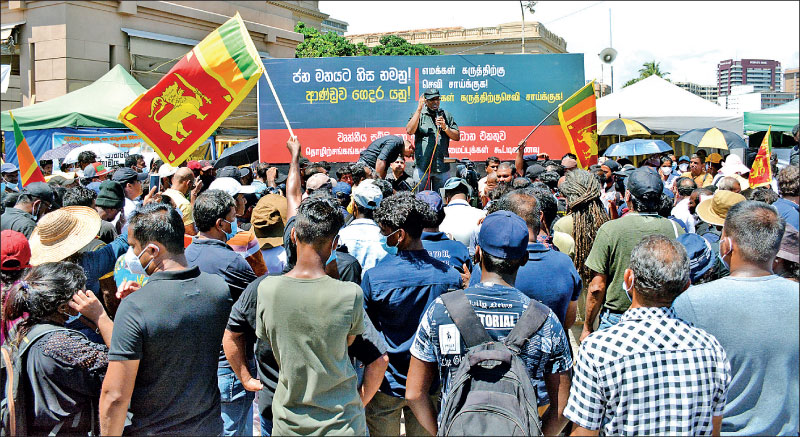Saturday Feb 14, 2026
Saturday Feb 14, 2026
Friday, 8 July 2022 02:50 - - {{hitsCtrl.values.hits}}

The youth protesters of Sri Lanka who have coined the slogan ‘GotaGoHome’ and brought it to the fore or the Opposition political parties which have subsequently borrowed or hijacked it from the former do not seem to have made a proper study or analysis of the practicality of it – Pic by Upul Abayasekara
 Mao Zedong said that “a fall into a pit, a gain in your wit”. But the downfall that has occurred in Sri Lanka has not resulted in making a special gain in Sri Lankan wit. In the context of the present crisis, the ideological plane of the country is overwhelmed almost completely by anarchic ideas. This particular mentality has weakened to a greater extent, the country’s ability to recover from the deep abyss it has fallen into.
Mao Zedong said that “a fall into a pit, a gain in your wit”. But the downfall that has occurred in Sri Lanka has not resulted in making a special gain in Sri Lankan wit. In the context of the present crisis, the ideological plane of the country is overwhelmed almost completely by anarchic ideas. This particular mentality has weakened to a greater extent, the country’s ability to recover from the deep abyss it has fallen into.
Sri Lanka has fallen to the first level of an immeasurably deep abyss of two levels. It is now in a situation where it is most likely to fall into the second level of it which is more deep and destructive. If the country fails to recover from the first layer of the abyss which it is now in, and falls into the second layer of it, it is inevitable that the country will be compelled to suffer a dreadful destruction not easy to recover from.
There is no doubt that Gotabaya Rajapaksa is a person not fit for the Presidency. Although this crisis is not his creation, the wrong policies followed by him after he became the President have aggravated the crisis and escalated it to a level of explosion. Also, he can be considered as a member of a political family which is corrupt and scandalous. There is no doubt that if he is removed from the presidency and a competent leader who can manage this crisis efficiently could be appointed as the president, certainly it will contribute to the common good of the country.
But the attempts made to achieve this goal by removing him from his position outside the established constitutional framework and in the absence of an acceptable and legitimate method which would not aggravate the crisis, might invariably push the country into the second abyss, which is much worse and very difficult to get out of.
Presidential system
The presidential system is built in such a way that the person elected the president cannot be removed from office during his official term of office except by an impeachment. After the establishment of the presidential system of governance in Sri Lanka, no president has been ousted while in office. The presidential system in the USA is more than 230 years old. Except for Richard Nixon, no other president of the USA has been removed or expelled from the presidency while in office. Nixon also was compelled to leave the office due to an impeachment.
In the Philippines, the dictatorial regime of President Ferdinand E. Marcos was ousted by a powerful public uprising in 1986; it happened not when he was the president, but when he was out of presidency and contesting a presidential election. He won the election in a close contest; but had to flee since millions of Filipinos along Epifanio de los Santos Avenue (EDSA) in Metro Manila, and in cities all over the country took to the streets against him in a very aggressive and powerful protest following his election victory being declared to be corrupt; subsequently Corazon C. Aquino, his main rival was sworn in as the elected President. It showcased to the world the singular strength of the Filipino people.
A similar thing happened in Bolivia in 2019. Evo Morales ran for his fourth term in 2019.
Despite leading the presidential election in the first round, he was forced to flee after the public took to streets in a massive campaign against him when the international election monitoring groups declared that he had won the election through corrupt practices. Consequently, Jeanine Anaez, his opponent became the president of Bolivia. Later, a Bolivian court found Jeanine Anez guilty of orchestrating a coup that brought her to power during a 2019 political crisis and sentenced her to 10 years in prison.
But the youth protesters of Sri Lanka who have coined the slogan ‘GotaGoHome’ and brought it to the fore or the Opposition political parties which have subsequently borrowed or hijacked it from the former do not seem to have made a proper study or analysis of the practicality of it.
Impeaching the President
If the President does not renounce the office voluntarily, it is inevitable that the removal of him from office through public protests orchestrated in the streets will become extremely difficult. Whatever may be the end result of the efforts made for that, it will inevitably jeopardise and confuse the ability to solve the balance of payments crisis and the economic crisis associated with it. On the other hand, following the first public uprising, there won’t be a possibility of bigger popular uprisings except for sporadic struggles occurring at different places. Obviously, no Opposition party has been able to develop themselves to a level capable of challenging the Government despite the fact that the Government has deteriorated to the maximum level. Also, a rapid decline could be seen in the acceptance of trade union movements.
It is almost unheard of in world history that two major uprisings do not erupt at very close intervals. The first revolution in Russia broke out in 1905. The second revolution occurred 12 years later in 1917. The first insurgency of the JVP burst out in 1971 and their second insurgency occurred 17 years later in 1986. It is inconceivable that there will be a public uprising strong enough to overthrow the Government on the instigation of political parties.
It is important to note that the Opposition in Parliament is not strong enough to wield the power in deciding who should be the next president in case Gotabaya renounces the presidency due to strong resistance by the forces of the Opposition. So much so, the next president will be decided by the Parliament where the Pohottuwa party commands more power. Under the circumstances, how can we guarantee that a president elected in that way will be more efficient and better than the incumbent president? What will be the outcome if the next president elected that way too becomes a source of ridicule of the public?
Instead of having such a complicated and circuitous political program which has no clear end in sight, why shouldn’t an interim all-party government be formed for the purpose of implementing a structural reform program that will lead to a profound change in the system while retaining the incumbent president in office as suggested by the “Reform Movement”?
Path to choose
It is only through such a government that the national consensus needed for adopting a macroeconomic policy framework as requested by the International Monetary Fund (IMF) which is acceptable to it and the World Bank could be achieved. Also, such a government will be able to formulate and implement a pragmatic strategic plan to effectively control the disaster situation caused by the crisis. It is only such a government that will have the potential and the ability to generate a general consensus for a reform program that will lead to the creation of a new and incorrupt country where national harmony and the rule of law reigns supreme, and is capable of overcoming the failed situation which the country has fallen into.
According to the new terms and conditions proposed to the IMF by the United States Senate, it appears that such a reform program is an indispensable condition for Sri Lanka to receive IMF support. As our movement has proposed, a common consensus can be reached for a reform program which must be implemented in two stages that are interconnected in the constitutional sense and under the supervision of the United Nations as well.
In addition to the appointment of Commissions or Committees of Officers to inquire into the affairs of the first stage of the program which must be completed in one year, it would be possible to choose a suitable system of governance, make necessary legal reforms to ensure a free and fair election to appoint representatives for its legislature and conduct an election to give the people the right to elect a government of their choice. By doing so, the first phase of the reform program can be completed. The second phase will include the conversion of the new government elected by the people into an all-party government and implementation of the reforms including the making of a “people’s participatory constitution” as prescribed in the interim constitution.
Such a reform program will inspire new hopes for the nation that has lost hope. It will unite the people and create a situation where the political parties could work together. It will help integrate the divided nation and rebuild the country which has collapsed, and makes it a great national task that should be performed by the entire nation. Such a program will enable the country to overcome the current failed state and re-emerge stronger. Also, it will give the ability to restore the international recognition that has been lost, and build it stronger.